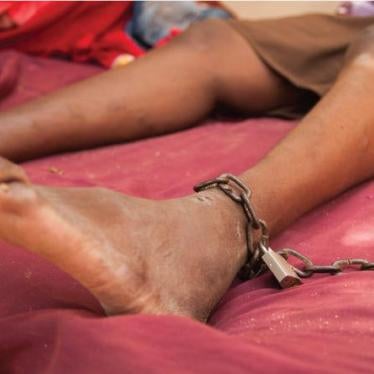(Nairobi) – The recent visit to Ghana by the United Nations expert on torture highlights the need to end abuses against people with mental disabilities. The government of Ghana should take steps to implement the 2012 Mental Health Act before the end of 2013.
The UN special rapporteur on torture, Juan Mendez, in his visit from November 8-14, expressed deep concern about the state of Ghana’s mental health care system, and called for urgent reform of both psychiatric hospitals and prayer camps warehousing those with mental disabilities.
“The UN expert on torture expressed serious concerns about the use of electro-shock therapy and prolonged shackling of people with mental disabilities,” said Shantha Rau Barriga, Disability Rights director at Human Rights Watch. “He sent a clear message: the Ghanaian government should do what it takes to end this inhuman and degrading treatment – and it should do so soon.”
As a first step, the government needs to carry out the provisions of the 2012 Mental Health Act, including setting up the oversight mechanism to begin visiting mental health facilities and unregulated prayer camps across the country, Human Rights Watch said.
In some of the thousands of privately run prayer camps in Ghana, people with mental disabilities – some as young as five – are shackled by their ankles to trees in open compounds, where they sleep, defecate, and bathe.
In his report to the UN in March this year, Mendez said that there is no therapeutic justification for the use of prolonged restraint of people with disabilities, and that any use of restraints for even a short period of time, may constitute torture or ill-treatment. He called on the Ghanaian government to make the Mental Health Act operational, including oversight of the prayer camps, by the end of 2013.
Human Rights Watch documented mistreatment of people with mental disabilities in Ghana in its 2012 report “‘Like a Death Sentence’: Abuses against Persons with Mental Disabilities in Ghana.” The report describes how thousands of people with mental disabilities such as bipolar disorder or schizophrenia are forced to live in psychiatric hospitals, often against their will, and with little possibility of challenging their confinement.
Human Rights Watch found that at least hundreds – and possibly thousands – of people with mental disabilities are kept in prayer camps associated with pentecostal and evangelical churches. Managed by self-proclaimed prophets, these camps operate completely outside of government control. People with mental disabilities at these camps do not receive any medical treatment and instead are forced to take herbal concoctions or deprived of any food or water for days. Some had been at the prayer camps for as long as five years.
The Special Rapporteur also expressed concern about the practice of electro-shock therapy in Accra Psychiatric Hospital, which is not used as a last resort and which is performed without anesthesia and without the free and informed consent of the patient. In Ghana’s psychiatric hospitals, Human Rights Watch also found a lack of trained mental health workers and overcrowded, filthy conditions, with foul odors in some wards or even feces on the floors due to broken sewage systems.
The government should create community-based support services, including housing and health care that enable people with mental disabilities to live in the community, Human Rights Watch said. The government should ensure that people are not forcefully detained in prayer camps or psychiatric hospitals and that they have access to mechanisms to challenge any violations of their rights.
“People with mental health problems need community-based support, not electro-shock treatment,” Barriga said. “We hope that the special rapporteur’s visit will spark real change in Ghana’s mental health care system. Thousands of people are counting on it.”








